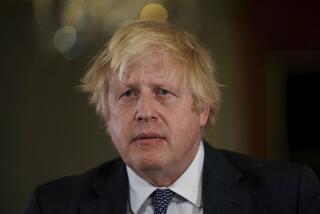Political Dirt Smudges Premier
- Share via
LONDON — The problem with ascending to public office as Mr. Clean, as British Prime Minister Tony Blair did last year, is that it is all too easy to get dirty in the business of government.
Blair, who rode to victory on a campaign against “Tory sleaze,” is facing allegations that his Labor government may have its own sleaze factor involving close ties between senior government officials and young Labor activists-turned-lobbyists.
London’s Sunday Observer newspaper, in an investigation of the Labor lobbyists, claimed last week that they have been trying to peddle advance knowledge of policy decisions, help in winning takeover bids, appointments to government task forces and lunches at 10 Downing St.
The paper’s evidence has been thin so far, and the investigation relies heavily on the boasting of young men known more for their smart suits and mobile telephones than their experience.
No one has yet accused government officials of taking cash or suggested that clients paid for inside information or profited from it.
Nonetheless, perception is nine-tenths of politics, and the scandal has given the Conservative opposition a weapon against the enormously popular Blair.
Opposition leader William Hague was quick to accuse Blair of having produced a government for sale.
“When are you going to stop protecting the money-grabbing cronies you’ve surrounded yourself with? They are featherbedding, pocket-lining, money-grabbing cronies,” Hague said in the House of Commons last week.
In an editorial Thursday, the Financial Times warned that the scandal has raised fears that Blair’s “business-friendly government has degenerated into crony capitalism.”
While insisting that this is not so, the Financial Times called for “scrupulous management” of the relationships between politicians and businesspeople.
The Economist magazine said the scandal has “drawn attention to this government’s character; to its psychological flaws, let us call them.” The magazine noted that many Britons appeared willing to believe in Labor government corruption despite the lack of evidence.
The current distrust stems, in part, from the fact that many Britons--and particularly old-school Laborites--do not like the Clintonesque “spin doctors” and public relations advisors surrounding Blair.
Further, although Britain has lobbyists--even members of Parliament are allowed to serve as paid lobbyists--their numbers are nowhere near the 14,000 who are registered in the United States. The brash young Labor lobbyists are a relatively new phenomenon and engender some hostility.
Most of the Observer’s expose rests on one of them--Derek Draper, a lobbyist with GPC Market Access who was an aide to Peter Mandelson, who is now minister without portfolio.
For the Observer investigation, American freelance reporter Gregory Palast posed as a representative of a U.S. energy company seeking to invest in Britain and contacted Draper for help.
In their conversations, Draper reportedly boasted that he could help the company find a seat on a government task force and secure meetings with top government officials.
He reportedly also claimed that he had provided another client with advance information that the government planned to cap the growth of public spending at 2.75% and not at the 2.5% that had been predicted. And, the Observer said, he claimed to have arranged meetings between the chairman of Britain’s leading power company, PowerGen, and Treasury officials to facilitate a takeover bid opposed by the Trade and Industry Ministry.
Draper denied all the allegations.
Blair has called the whole scandal baseless, although he ordered his government to draw up clear rules on contacts between government officials and lobbyists.
Draper was suspended from his lobbying job and then resigned.
More to Read
Sign up for Essential California
The most important California stories and recommendations in your inbox every morning.
You may occasionally receive promotional content from the Los Angeles Times.










